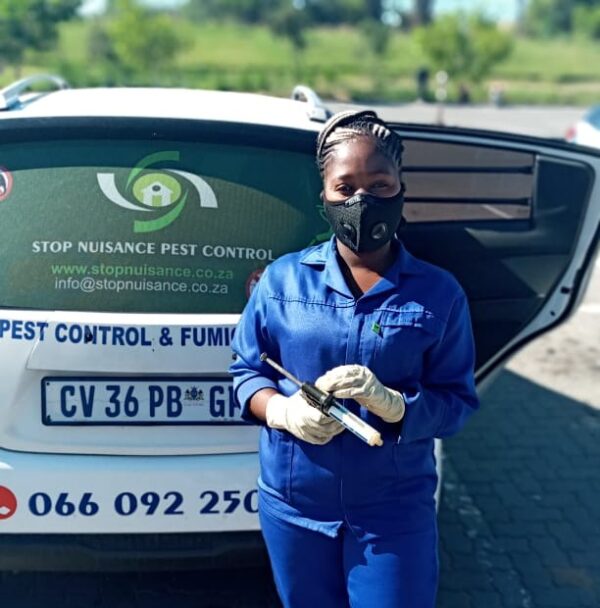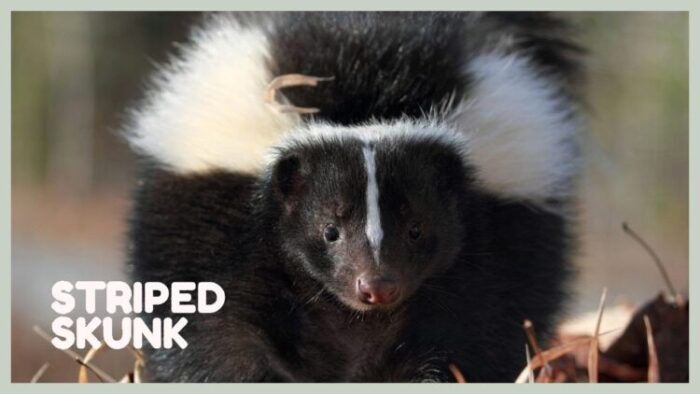Skunks are known for their unique and potent defense mechanism – spraying a strong, unpleasant odor when threatened. However, little is known about the sounds that baby skunks make. As cute and cuddly as they may appear, skunk babies, like adult skunks, are equipped early on to defend themselves if needed. In this article we talk about Do Skunk Babies Make Noise.
So, do skunk babies make noise? The short answer is yes, skunk babies do make noises, though they tend to be quieter than adult skunks. They may squeak, chirp or cry out when communicating with their mother and siblings in the den. Here’s a more in-depth look at the sounds and behaviors of infant skunks.
Table of Contents
Skunk Babies in the Den
Baby skunks, called kits or kittens, are born deaf and blind in early spring. Litters range from 2 to 10 babies, with 4 to 7 being typical. For the first few weeks, kits remain in the underground den, nestled closely to their mother for warmth as they continue to develop. At this young age, their eyes are closed and ears are folded over, limiting their senses. Kits rely primarily on touch and smell those first couple weeks.
During these early weeks in the safety of the den, skunk babies vocalize softly as they snuggle with litter-mates and nurse. Scientists have documented a repertoire of squeaks, warbles, squeals and distress calls used by kits to communicate basic needs like hunger, warmth or fear. These primitive baby noises allow them to connect with mom and siblings in the darkness of the den. Their vocalizations are described as “bird-like” in quality by some wildlife rehabilitators.
The reason skunk babies stay so quiet in the den is likely a protective adaptation – both to avoid attracting predators and to prevent attracting the unwanted attention of male skunks. Female skunks are extremely protective and defensive of their young. So keeping a low profile through the first month or so of rapid development is key to their survival.
Leaving the Den
At around one month old, kits open their eyes, begin exploring the den and emerge for short adventures outside. As their mobility, vision and hearing improve, their vocal communication and defensive abilities also strengthen. They practice stamping their feet and adopt threat postures that mimic adult skunks, though they cannot yet spray musk.
During this transitional stage from den-bound infants to juvenile wanderers, kits become more vocal. They follow their mother single file on foraging trips, often whimpering or mewling if separated from her or siblings. Their squeaks and cries grow louder and carry farther as they navigate the wider world outside the den. This is when skunk babies may attract more attention with their vocalizations, sometimes to their detriment.
Dangers for Noisy Youngsters
The downside to noisy baby skunks is that they can attract predators when outside the safety of the burrow. Snakes, owls, coyotes, foxes, bobcats and domestic dogs have all been known to prey on vulnerable skunk kits. This is why having mom nearby for protection remains extremely important until kits reach adulthood at around 2 to 3 months old.
Kits also become targets for male skunks seeking mating opportunities. Female skunks are extremely protective of their young, hissing, stamping and arching their tails to warn males away. But loud squealing from separated young can draw unwanted interest from roaming males. Females may spray advancing males or even attack to drive intruders away and defend kits.
In addition to natural predators, noisy baby skunks wandering suburbia may encounter other deadly hazards – cars, window wells, trash cans, glue traps or pesticides. Well-meaning humans may also inadvertently do more harm than good attempting to “rescue” healthy kits. Young skunks vocalizing or following behind their mother is totally normal behavior. Only orphaned, sick or injured babies require rehabilitation assistance.
Skunk Spraying Capabilities
While baby skunks under two months old cannot spray, they show early signs of this formidable defense tactic. Kits may adopt a threat stance, stamp their feet, arch their tails or charge as practice for the real thing.
Most wild baby skunks have developed their full musk spray ability by eight weeks old. Typically, kits discharged musk for the first time accidentally in response to a major scare. Being startled or bitten by predators often triggers a kit’s first spray. The early version tends to be a fine mist rather than a focused stream. But despite poor aim initially, the odor potency is just as strong as an adult’s.
Domestic skunk kits may demonstrate this rite of passage at an earlier age. Breeders report baby pet skunks as young as four weeks old able to spray a noxious mist when frightened or mishandled. Proper socialization and gentle handling from an early age can prevent undesirable spraying later on though.
Bonding With Babies
While possible to acquire before weaning, veterinarians recommend waiting until at least six weeks of age to separate kits from their mother. This allows important social and survival lessons to be learned as juveniles. Bonding and training will be most successful once spray glands have been surgically removed by eight weeks old. Gland removal while young prevents unpleasant spraying incidents as pets mature.
De-scented domestic skunks can make affectionate, intelligent pets. But perspective owners should thoroughly research proper care before obtaining one. It’s critical to find a licensed exotic animals veterinarian for checkups and necessary medical procedures like de-scenting and spay/neuter surgeries. Providing the correct diet, housing, enrichment and handling takes dedication to keeping these unique animals healthy and happy.
While baby skunks have an irresistible appeal, laws prohibit removing wildlife from natural habitats. Skunks serve vital ecological roles and lack survival skills for domestication when taken from the wild. Sadly, well-intentioned attempts by unqualified people to raise orphaned or abandoned kits often end tragically. Only state and federally licensed rehabilitators have the training and resources to care for injured, sick or orphaned skunks.
The Takeaway
In summary, as part of normal communication and development, skunk kittens do make various squeaking, mewling and crying sounds, especially between two to eight weeks old. Their vocalizations allow necessary interactions with mother and siblings in the den and later while foraging outside. But loud baby skunk noises can put them at increased risk of attracting predators. Mothers are extremely protective though and will defend kits from harm fiercely.
While their noises may be cute, observing wild skunk families is best done from a respectful distance for their wellbeing and ours! And rescuing baby skunks should be left only to qualified wildlife rehabilitators. With good socialization, gentle handling and proper care though, domesticated skunks can become delightful lifelong companions. I sincerely hope you find this “Do Skunk Babies Make Noise?” article helpful.

With over 5+ years of experience in pest control and a PhD in Entomology, our author brings a blend of scientific knowledge and practical expertise to Pestifier.com. Passionate about creating pest-free environments, they provide effective tips and strategies for managing and preventing pest infestations. Connect on Facebook for the latest updates and insights.

